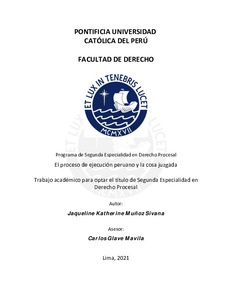| dc.contributor.advisor | Glave Mavila, Carlos | |
| dc.contributor.author | Muñoz Sivana, Jaqueline Katherine | |
| dc.date.accessioned | 2022-03-24T23:31:47Z | |
| dc.date.available | 2022-03-24T23:31:47Z | |
| dc.date.created | 2021 | |
| dc.date.issued | 2022-03-24 | |
| dc.identifier.uri | http://hdl.handle.net/20.500.12404/21959 | |
| dc.description.abstract | El presente trabajo de investigación analiza la relación entre la tutela ejecutiva y la institución
procesal de la cosa juzgada. El objetivo fundamental propuesto es determinar si la decisión
emitida en el marco de la tutela ejecutiva puede tener la autoridad de cosa juzgada. En este
sentido, la hipótesis que se formula consiste en que, toda vez que el ejecutado se encuentra
limitado en sus alegaciones por la regulación de nuestro Código Procesal Civil peruano y que
la tutela ejecutiva no implica una cognición plena, lo decidido en el proceso de ejecución no
puede gozar de la autoridad de la cosa juzgada. Para ello, se realiza un análisis e investigación
de la institución de la cosa juzgada, de la tutela ejecutiva y, sobre todo, del incidente de
contradicción del proceso de ejecución peruano. Luego de la investigación se concluye que,
si bien debe respetarse el mandato que ordena seguir adelante con la ejecución, lo resuelto
sobre el derecho aparentemente cierto y que será ejecutado no puede gozar de la calidad de
cosa juzgada. De lo contrario, el ordenamiento jurídico estaría avalando la inmutabilidad de
decisiones injustas. Esto atendiendo a la naturaleza de la tutela ejecutiva y de la contradicción
como un incidente de cognición sumaria. | es_ES |
| dc.description.abstract | This report analyzes the relationship between execution process and the procedural
institution of res judicata. The fundamental objective is to determine whether the decision
issued under the execution process may have the authority of res judicata. In this sense, the
hypothesis that is formulated is that every time that the execution process is limited in his
allegations by the regulation of our Código Procesal Civil and that execution process does
not imply full cognition, the enforcement proceedings cannot enjoy the authority of res
judicata. To this end, an analysis and investigation of the institution of res judicata of
executive guardianship is carried out and, above all, the incident of contradiction of the
Peruvian execution process. After the investigation, it is concluded that although the mandate
that orders the execution to continue must be respected the decision on the apparently certain
right and to be enforced cannot enjoy the quality of res judicata. Otherwise, the legal system
would be endorsing the immutability of unjust decisions. This is taking into account the
nature of execution process and the contradiction as an incident of summary cognition. | es_ES |
| dc.language.iso | spa | es_ES |
| dc.publisher | Pontificia Universidad Católica del Perú | es_ES |
| dc.rights | info:eu-repo/semantics/openAccess | es_ES |
| dc.rights.uri | http://creativecommons.org/licenses/by-nc-sa/2.5/pe/ | * |
| dc.subject | Derecho procesal civil--Perú | es_ES |
| dc.subject | Tutela jurisdiccional--Perú | es_ES |
| dc.subject | Cosa juzgada--Perú | es_ES |
| dc.title | El proceso de ejecución peruano y la cosa juzgada | es_ES |
| dc.type | info:eu-repo/semantics/bachelorThesis | es_ES |
| thesis.degree.name | Segunda Especialidad en Derecho Procesal | es_ES |
| thesis.degree.level | Título Profesional | es_ES |
| thesis.degree.grantor | Pontificia Universidad Católica del Perú. Facultad de Derecho | es_ES |
| thesis.degree.discipline | Derecho Procesal | es_ES |
| renati.advisor.dni | 42244498 | |
| renati.advisor.orcid | https://orcid.org/0000-0003-3545-761X | es_ES |
| renati.author.dni | 72378622 | |
| renati.discipline | 421109 | es_ES |
| renati.level | https://purl.org/pe-repo/renati/level#tituloSegundaEspecialidad | es_ES |
| renati.type | https://purl.org/pe-repo/renati/type#trabajoAcademico | es_ES |
| dc.publisher.country | PE | es_ES |
| dc.subject.ocde | https://purl.org/pe-repo/ocde/ford#5.05.01 | es_ES |






